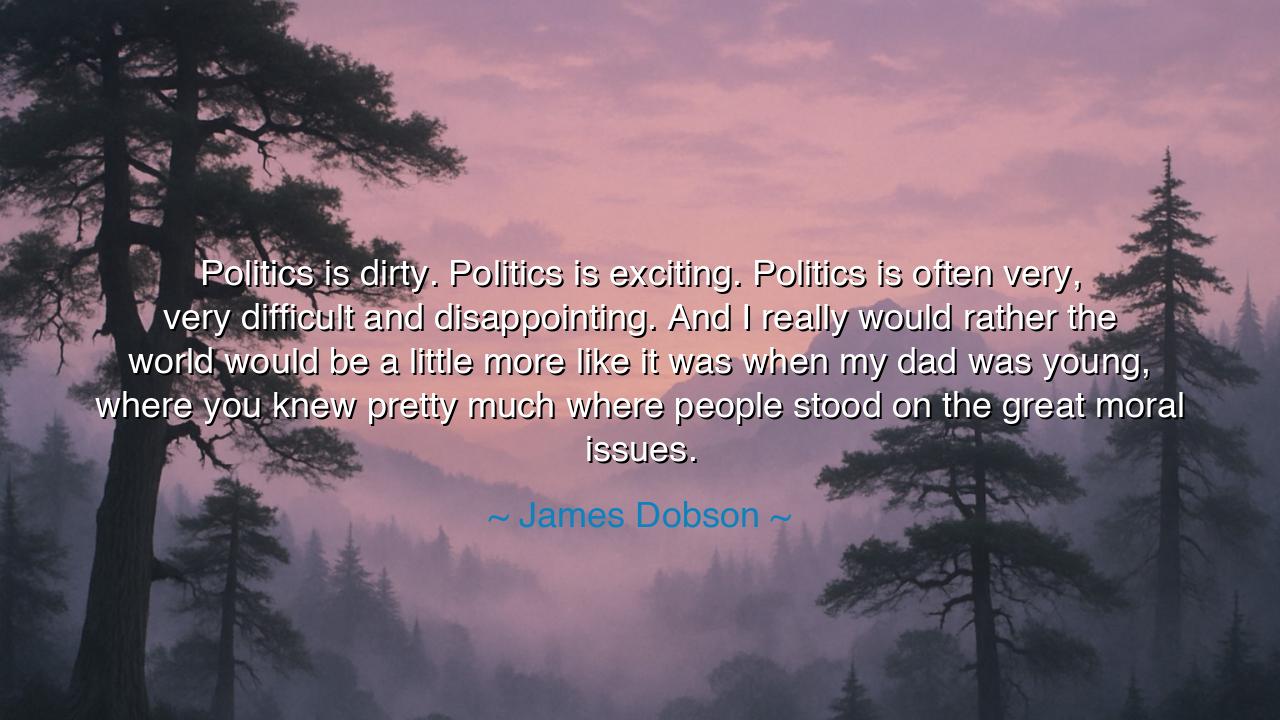
Politics is dirty. Politics is exciting. Politics is often very
Politics is dirty. Politics is exciting. Politics is often very, very difficult and disappointing. And I really would rather the world would be a little more like it was when my dad was young, where you knew pretty much where people stood on the great moral issues.






When James Dobson declared, “Politics is dirty. Politics is exciting. Politics is often very, very difficult and disappointing. And I really would rather the world would be a little more like it was when my dad was young, where you knew pretty much where people stood on the great moral issues,” he spoke not merely of government but of the moral confusion of an age. In these words, Dobson laments the loss of clarity, the erosion of conviction that once defined public life. His tone is both weary and nostalgic—acknowledging the thrill and chaos of politics, yet mourning a time when the lines between right and wrong seemed bolder, when men and women stood firm in belief rather than swaying to the winds of convenience. His reflection is not only political—it is deeply spiritual, a yearning for integrity in an age of compromise.
The origin of this thought arises from Dobson’s lifelong involvement in public discourse as a psychologist, author, and moral voice within American society. He witnessed, over decades, how politics, once viewed as a noble service to truth and justice, became entangled with self-interest, spectacle, and deceit. The dirtiness he speaks of is not only the corruption of power but the corruption of conviction—a state in which leaders no longer stand upon moral ground, but shift with each passing moment of popular favor. Yet in the same breath, he admits that politics retains its excitement—for it is the arena where ideals wrestle with reality, where courage and cunning coexist, and where the soul of a nation is revealed. To him, this tension—between dirt and destiny, between nobility and deceit—is what makes politics both maddening and fascinating.
When he recalls the days “when my dad was young,” Dobson summons the spirit of an earlier America—a time, perhaps imagined or idealized, when moral questions seemed simpler, when people stood openly for their beliefs without fear of ridicule or cancellation. It was an era when honor was public, when even opponents respected the courage of conviction. Yet his nostalgia carries a sorrowful wisdom, for he knows that such simplicity is gone, replaced by a world where every truth is questioned, every value negotiated. The clarity of the past, whether real or perceived, stands in contrast to the moral fog of the present, and Dobson’s words become a quiet cry for direction—for a generation to find once again the spine of principle amid the shifting sands of politics.
The ancients, too, knew the danger of politics without virtue. Plato, in his Republic, warned that when justice departs from governance, the state decays into tyranny or chaos. The philosopher Cicero, lamenting the fall of the Roman Republic, said that the collapse of morals is the prelude to the collapse of nations. In their wisdom, they understood what Dobson now reminds us: that politics is a mirror of the soul of a people. When the citizens themselves are guided by truth and courage, their leaders rise to reflect that greatness. But when the people become cynical, indifferent, or divided, their leaders mirror that weakness. The dirt of politics, then, is not born in the halls of government—it is born in the hearts of the governed.
Consider, for example, the life of Abraham Lincoln, who entered politics not for wealth or comfort, but for conscience. He lived in an age as divided and contentious as our own, yet he did not bend to the pressures of popularity. His clarity on the moral issue of slavery—his willingness to stand upon that truth, even when it cost him dearly—shines as an eternal example of what Dobson yearns for. Lincoln’s politics were not clean, for he had to navigate compromise and bloodshed, yet his moral compass remained unshaken. In him, we see that the nobility of politics does not lie in its purity, but in the integrity of those who endure its filth without losing their souls.
Dobson’s acknowledgment that politics is both dirty and exciting carries a paradox worthy of contemplation. For life itself is like politics—full of contradiction, struggle, and imperfection. One cannot hope to keep one’s hands clean if one wishes to shape the world; yet one must guard the heart against becoming as soiled as the world one seeks to change. The true challenge, then, is not to escape the dirt, but to walk through it without forgetting the light. Those who despair at the corruption of politics must remember that renewal does not come from withdrawing, but from engaging with honor, from being the rare voice that speaks truth amid deception.
So, my children of the present age, take heed of this wisdom: the world will never again be as simple as it once seemed, but clarity can still be found in courage. Do not look to politics alone to restore morality; let morality begin within you. Speak truth even when it costs you favor. Stand firm on what is right, even when it isolates you. For if each person lived with integrity, politics itself would grow cleaner, clearer, more human. As James Dobson teaches, the dirt of politics is real, but so too is its potential for good. Seek neither escape nor despair—seek steadfastness. In an age of confusion, be the one who stands, and by your standing, remind the world once more where honor truly lies.






AAdministratorAdministrator
Welcome, honored guests. Please leave a comment, we will respond soon